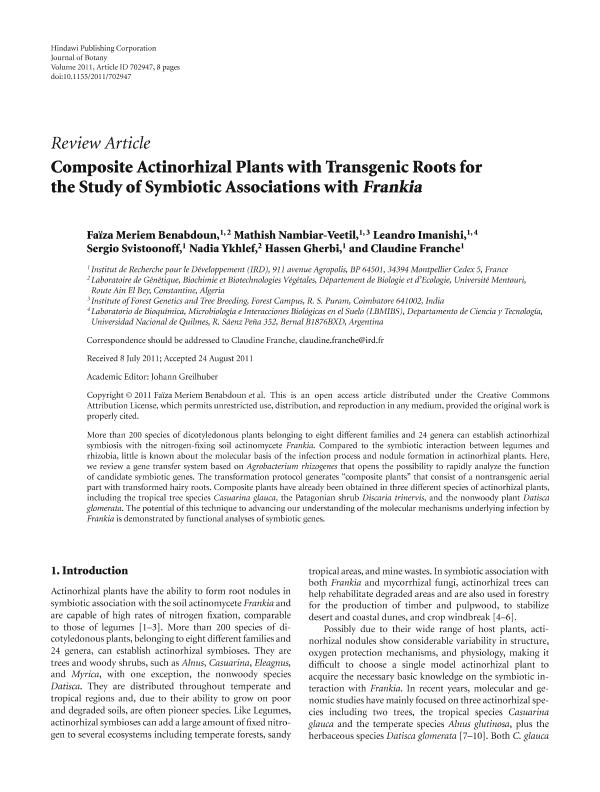Artículo
Composite Actinorhizal Plants with Transgenic Roots for the Study of Symbiotic Associations with Frankia
Meriem Benabdoun, Faiza; Nambiar Veetil, Mathish; Imanishi, Leandro Ezequiel ; Svistoonoff, Sergio; Ykhlef, Nadia; Gherbi, Hassen; Franche, Claudine
; Svistoonoff, Sergio; Ykhlef, Nadia; Gherbi, Hassen; Franche, Claudine
 ; Svistoonoff, Sergio; Ykhlef, Nadia; Gherbi, Hassen; Franche, Claudine
; Svistoonoff, Sergio; Ykhlef, Nadia; Gherbi, Hassen; Franche, Claudine
Fecha de publicación:
08/2011
Editorial:
Hindawi Publishing Corporation
Revista:
Journal of Botany
ISSN:
2090-0120
Idioma:
Inglés
Tipo de recurso:
Artículo publicado
Clasificación temática:
Resumen
More than 200 species of dicotyledonous plants belonging to eight different families and 24 genera can establish actinorhizal symbiosis with the nitrogen-fixing soil actinomycete Frankia. Compared to the symbiotic interaction between legumes and rhizobia, little is known about the molecular basis of the infection process and nodule formation in actinorhizal plants. Here, we review a gene transfer system based on Agrobacterium rhizogenes that opens the possibility to rapidly analyze the function of candidate symbiotic genes. The transformation protocol generates ?composite plants? that consist of a nontransgenic aerial part with transformed hairy roots. Composite plants have already been obtained in three different species of actinorhizal plants, including the tropical tree species Casuarina glauca, the Patagonian shrub Discaria trinervis, and the nonwoody plant Datisca glomerata. The potential of this technique to advancing our understanding of the molecular mechanisms underlying infection by Frankia is demonstrated by functional analyses of symbiotic genes.
Archivos asociados
Licencia
Identificadores
Colecciones
Articulos(SEDE CENTRAL)
Articulos de SEDE CENTRAL
Articulos de SEDE CENTRAL
Citación
Meriem Benabdoun, Faiza; Nambiar Veetil, Mathish; Imanishi, Leandro Ezequiel; Svistoonoff, Sergio; Ykhlef, Nadia; et al.; Composite Actinorhizal Plants with Transgenic Roots for the Study of Symbiotic Associations with Frankia; Hindawi Publishing Corporation; Journal of Botany; 8-2011; 1-8
Compartir
Altmétricas



